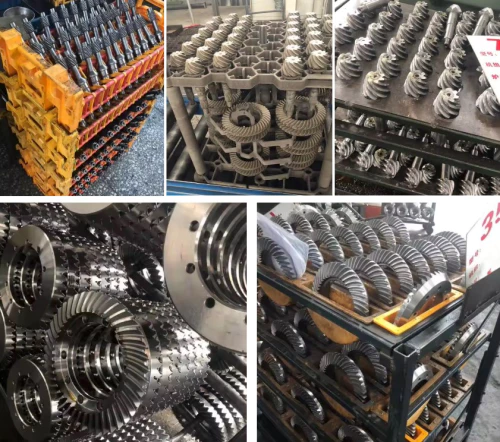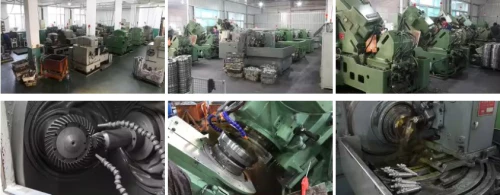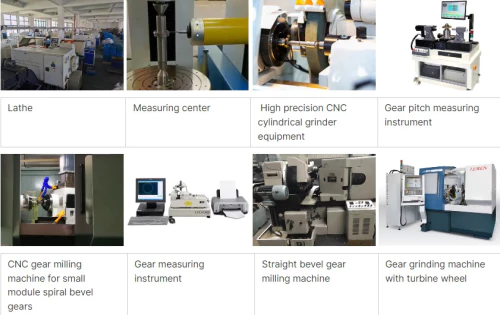Forging Bevel Gear Surface Roughness Measurement Tools
Introduction
Forging bevel gears are a type of bevel gears that are manufactured through the forging process. Forging involves shaping metal through the application of localized compressive forces, typically using a die or hammer. In the case of bevel gears, the forging process is used to form the gear teeth and create the desired gear geometry.
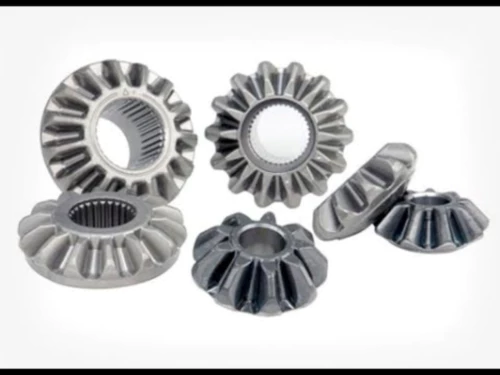
Advantages
- High Strength: Forging bevel gears have high strength due to the metal's improved grain structure.
- Improved Fatigue Resistance: The forging process enhances the fatigue resistance of bevel gears, making them suitable for heavy-duty applications.
- Precise Gear Tooth Geometry: Forging allows for precise shaping of the gear teeth, ensuring accurate and efficient power transmission.
- Cost-Effectiveness: Despite the initial investment in forging equipment, the cost per unit of forged bevel gears is lower compared to other manufacturing methods.
- Versatility in Material Selection: Forging can be performed on various metals, allowing for the selection of materials that best suit the application requirements.
- Enhanced Structural Integrity: The forging process eliminates internal defects, resulting in a structurally sound and reliable gear.
- Tailored Mechanical Properties: By controlling the forging process parameters, the mechanical properties of bevel gears can be customized to meet specific demands.
- Reduced Lead Time: Forging bevel gears have shorter production lead times compared to other manufacturing methods.
- Environmental Sustainability: The forging process generates less scrap material and waste compared to other manufacturing processes, making it environmentally friendly.
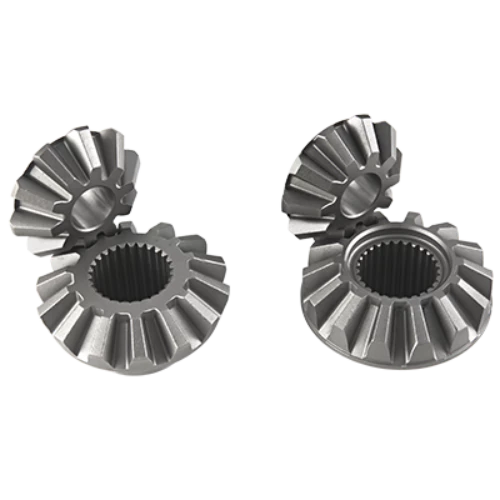
Working Principles
Forging bevel gears operate based on the fundamental principles of gear mechanisms. They consist of two intersecting shafts, each with a conically shaped gear (bevel gear) mounted on it. The teeth of the bevel gears are designed to have a specific tooth profile, such as straight, spiral, or hypoid, depending on the application requirements.
When the input shaft rotates, the engagement of the teeth of the bevel gears causes a transfer of rotational motion and torque to the output shaft. The contact between the mating teeth ensures power transmission while maintaining proper alignment and smooth operation.
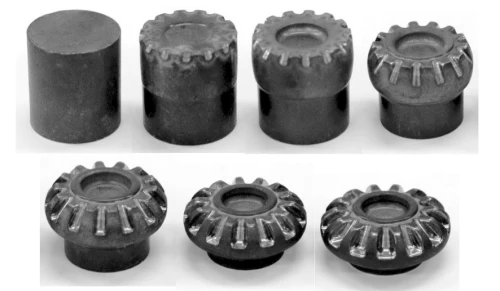
Applications
- Automotive Industry: Forging bevel gears are widely used in automotive applications, such as in the transmission systems of cars, trucks, and motorcycles.
- Industrial Machinery: They are employed in various industrial machinery, including machine tools, printing presses, and conveyor systems.
- Aerospace and Defense: Forging bevel gears play a crucial role in aerospace and defense applications, such as in aircraft engines and missile guidance systems.
- Renewable Energy: They are used in wind turbines and solar tracking systems to convert rotational motion into electrical energy.
- Marine and Shipbuilding: Forging bevel gears are used in marine propulsion systems and shipbuilding applications.
- Agricultural Machinery: They are employed in agricultural machinery, such as tractors and combines, for efficient power transmission.
- Power Generation: Forging bevel gears are utilized in power generation equipment, including generators and turbines.
- Robotics and Automation: They are integral components in robotics and automation systems, providing precise motion control.
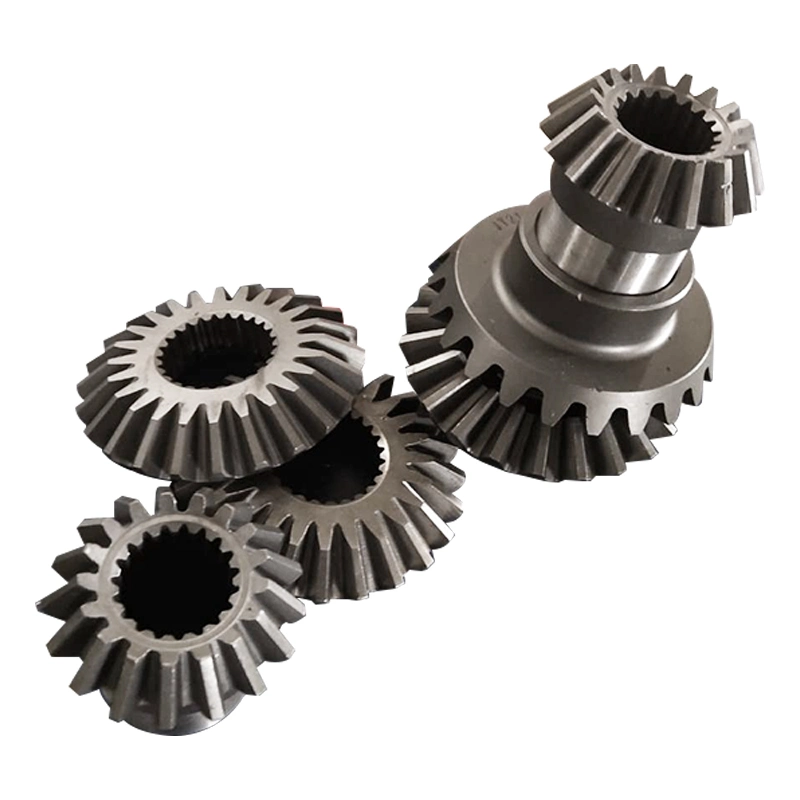
Installation and Maintenance
Installation
- Proper Alignment: Ensure the bevel gears are correctly aligned before installation to prevent premature wear and failure.
- Lubrication: Apply suitable lubricants to reduce friction and ensure smooth gear operation.
- Mounting Bolts: Secure the bevel gears firmly using appropriate mounting bolts to prevent looseness or misalignment.
- Inspection: Conduct thorough inspections to verify proper installation and identify any issues that may affect gear performance.
Maintenance
- Lubrication: Regularly lubricate the bevel gears to maintain optimal performance and prevent excessive wear.
- Cleaning: Keep the gears clean to remove any debris or contaminants that may interfere with their operation.
- Inspection: Periodically inspect the gears for signs of damage or wear and address any issues promptly.
- Replacements: Replace worn or damaged gears with new ones to ensure reliable and efficient gear operation.
- Gearbox Maintenance: Properly maintain the gearbox that houses the bevel gears to prolong its lifespan.
- Load Monitoring: Monitor the load on the gears to prevent overloading, which can lead to premature failure.
- Training and Expertise: Train personnel responsible for gear maintenance to ensure proper handling and maintenance procedures.
- Record-Keeping: Maintain records of gear maintenance activities and inspections for future reference and analysis.
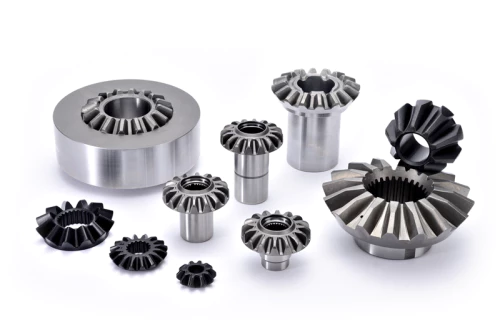
Selecting the Right Forging Bevel Gear
- Application Requirements: Consider the specific requirements and operating conditions of the application.
- Design and Specifications: Determine the gear design and specifications that best suit the application needs.
- Material Selection: Select the appropriate material for the bevel gear based on factors such as strength, durability, and corrosion resistance.
- Quality and Reliability: Choose gears from reputable manufacturers known for producing high-quality and reliable products.
- Load-Carrying Capacity: Ensure the selected gear can handle the intended load without experiencing premature failure.
- Efficiency and Performance: Consider factors such as gear efficiency and performance to optimize system performance.
- Customization and Adaptability: Look for manufacturers that offer customization options to meet specific application requirements.
- Cost Considerations: Consider the cost-effectiveness of the gear in relation to its performance and expected lifespan.
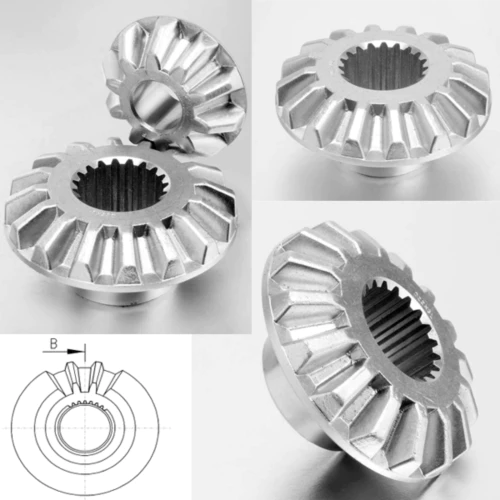
About Shaoxing Chaoli
Shaoxing Chaoli is a professional manufacturer of gears in China. Our products are exported to different countries such as Spain, the Netherlands, the United States, South Korea, Turkey, and Russia. We are committed to helping customers develop new products and solving technical and quality problems. Our company adheres to the principles of quality first, timely delivery, and credit first, and we warmly welcome cooperation with partners from the business community.
In addition to forging bevel gears, Shaoxing Chaoli also offers other gear products, including worm gears, spiral bevel gears, helical gears, spur gears, plastic gears, and metric gear racks. We welcome inquiries for customized products.
